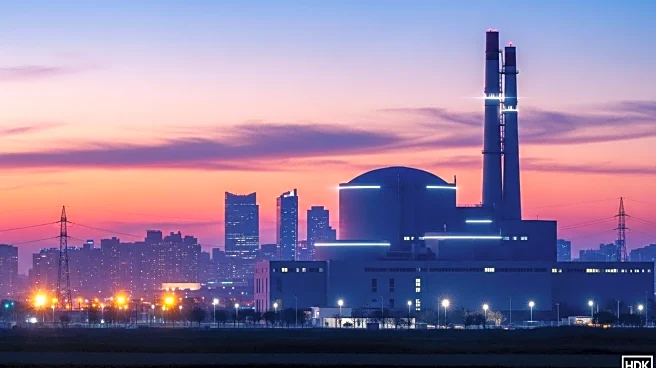What is the story about?
What's Happening?
The resurgence of nuclear energy is being driven by the increasing power demands of AI technologies, with major tech companies and policy changes at the forefront. Goldman Sachs projects a 165% increase in energy consumption by data centers over the next five years, necessitating significant nuclear capacity. Currently, only about 10% of the required 85-90 gigawatts of nuclear power is available. Companies like Microsoft and Amazon are investing heavily in nuclear energy, with Microsoft signing a 20-year agreement to restart a reactor at Three Mile Island and Amazon investing $500 million in small modular reactors (SMRs). The U.S. government is also supporting this shift, aiming to triple nuclear capacity by 2050 and passing legislation to modernize nuclear licensing.
Why It's Important?
This development is crucial as it addresses the dual challenges of meeting the growing energy demands of AI technologies and reducing carbon emissions. The shift towards nuclear energy could significantly impact the U.S. energy landscape, providing a stable and low-carbon power source that complements renewable energy. Tech companies stand to benefit from reliable energy supplies, while the nuclear industry could see revitalization through increased investments and policy support. However, challenges such as supply chain bottlenecks, workforce shortages, and cybersecurity threats remain significant hurdles.
What's Next?
The U.S. plans to continue expanding its nuclear capacity, with government initiatives to streamline licensing and support domestic fuel production. The focus will be on deploying advanced reactors and integrating them with renewable energy sources. The industry must address potential public skepticism and regulatory challenges to ensure a successful transition. Internationally, countries are collaborating to increase nuclear capacity, with agreements to build new plants and reclassify nuclear as a green investment.
Beyond the Headlines
The nuclear renaissance could lead to a more diversified and resilient energy grid, balancing the intermittent nature of renewables with the reliability of nuclear power. Ethical and geopolitical considerations, such as uranium supply and waste management, will need careful handling. The integration of AI in nuclear project management could streamline construction and reduce costs, but the industry must avoid over-reliance on unproven technologies and ensure public trust through transparent practices.
















